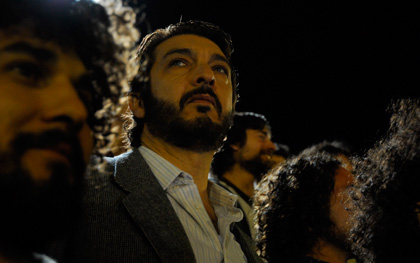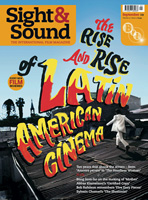Film review: The Secret in Their Eyes
Spain/Argentina 2009

Reviewed by Maria Delgado
Synopsis
Our synopses give away the plot in full, including surprise twists.
Buenos Aires, 1974. Benjamín Espósito and Pablo Sandoval, legal investigators at one of the city’s criminal courts, are joined by a new boss, Cornell-trained lawyer Irene Menéndez Hastings. Benjamín and Irene are clearly attracted to one another. Benjamín is preoccupied by the brutal rape and murder of young, recently married schoolteacher Liliana Coloto. He refuses to accept his colleague Romano’s conclusions (endorsed by senior judge Fortuna) that two builders carrying out work in her apartment building committed the crime, suspecting that her old friend Isidoro Gómez may be responsible. With Sandoval’s help, Benjamín tracks Gómez down at a football match and brings him to justice. Romano, however, secures Gómez’s early release as a police informer. Benjamín begins to fear for his and Irene’s safety. Following Sandoval’s murder, Irene secures a job for Benjamín in Jujuy, in the extreme north of the country, where Gómez and Romano can’t reach him.
Twenty-five years later, back in Buenos Aires, Benjamín is writing a novel based on the case. He traces Liliana’s widower, Ricardo Morales. Morales claims to have murdered Gómez but Benjamín remains suspicious. Returning to Morales’ house, he finds that he has imprisoned Gómez in a makeshift jail to serve out the remainder of his life sentence.
Benjamín goes to Irene’s office to declare his love for her.
Review
With The White Ribbon and A Prophet runaway favourites for this year’s best foreign-language Oscar, there was a palpable sense of surprise when Argentine outsider Juan José Campanella’s The Secret in Their Eyes pipped both to the post. It appears, on the surface, to be a conservative choice: a romance-cum-thriller that delivers star-crossed lovers, a gruesome murder, parallel love stories and entertaining narrative twists across two time periods. Scratch a little deeper, however, and the structural conceit of an unsolved murder investigated by legal clerk Benjamín Espósito (Campanella regular Ricardo Darín) in 1970s Buenos Aires proves the hinge for a probing examination of historical memory, vigilante justice and modes of reimagining the traumas of the past in a country scarred by the legacy of a brutal military dictatorship.
Darín’s central performance is a consummate lesson in minimalist acting, deftly bypassing the tropes of the clichéd romantic lead and the crusading good guy. Campanella has compared his favoured actor to both Tom Hanks and Henry Fonda, and the latter’s upright Juror 8 in 12 Angry Men (1957) is certainly a reference point in Darín’s depiction of working-class outsider Benjamín, obsessed by the unsolved murder of a newly married schoolteacher and trapped within the labyrinthine workings of the Argentine judicial system. Even when melodrama threatens to overtake the plot – as with the caricatured smugness of Benjamín’s nemesis, fellow investigator Romano – Darín ensures that his own performance remains commendably understated.
Soledad Villamil is very watchable too as Benjamín’s superior officer Irene, the prim, upper-middle-class lawyer who falls for her deputy. Plotwise, Campanella is careful not to give too much away too easily, and genuinely keeps the viewer guessing to the very end. Large set pieces – such as a thrilling chase through Buenos Aires’ Tomás Ducó football stadium – are juxtaposed with more intimate confessional exchanges where eyes are often the focus of the pictorial gaze.
Campanella expertly suggests the corruption and chaos underpinning the legal system in 1970s Argentina: cases are passed across different precincts when legal officers want to avoid complications; the poor and vulnerable are framed as suspects because they are easy targets. A Bolivian immigrant is one of two innocent men framed for the schoolteacher’s murder by a legal officer keen to close the case without ruffling any feathers. Platitudes, flattery, judicial inertia and delays are shown to be the name of the game as Argentina tumbles towards the social unrest that will end in General Videla’s military coup in 1976. (Signicantly, Benjamín’s boss Judge Fortuna is presented as a wizened Julio Iglesias with more than a passing resemblance to Videla.)
Benjamín’s physical fight with the unctuous Romano points to the two Argentinas that were to come into brutal conflict during the Dirty War. Romano views justice as “nothing but an island” and opts for abrasive methods of policing to deal with “the real world”. Benjamín confronts him and is consequently dispatched for his own safety to the north-west outpost of Jujuy; 30,000 were not so lucky, ‘disappearing’ in a culture of fear and coercion overseen by the Fortunas and policed by the Romanos of Argentine society. The Secret in Their Eyes expertly delineates the different cogs that clicked into place to ensure the slick running of the dictatorship’s erasure of dissent.
But the film is also about memory and modes of remembering. Memories are shown to be evasive, slippery and subject to continuous rewriting – Benjamín repackages the past in the form of a novel but his narrative is not as Irene remembers it. “Forget about it,” the sorrowful widower Morales warns him. But forgetting, as Campanella demonstrates, is not an option for the sector of Argentine society that Benjamín represents.
The film’s huge success in Argentina testifies to a resonance that goes beyond its observable generic appeal. Its romantic closure becomes synonymous with the process of healing and redemption undertaken by a nation coming to terms with the ghosts in its closet.
See also
Argentine cinema: state of the grain: Maria Delgado reports from the 2010 Buenos Aires Independent Film Festival, launchpad of the new Argentine Cinema (online, May 2010)
BirdWatchers reviewed by Sophie Mayer (October 2009)
A trilogy of closely observed characters: Quintín on Lisandro Alonso's Liverpool (November 2008)
Born and Bred reviewed by Maria Delgado (September 2007)
Credits
- Director
- Juan José Campanella
- Producers
- Mariela Besuievsky
- Juan José Campanella
- Screenplay
- Eduardo Sacheri
- Juan José Campanella
- Based on the novel La pregunta de sus ojos by Eduardo Sacheri
- Director of Photography
- Félix Monti
- Editor
- Juan José Campanella
- Art Director
- Marcelo Pont
- Music
- Federico Jusid


